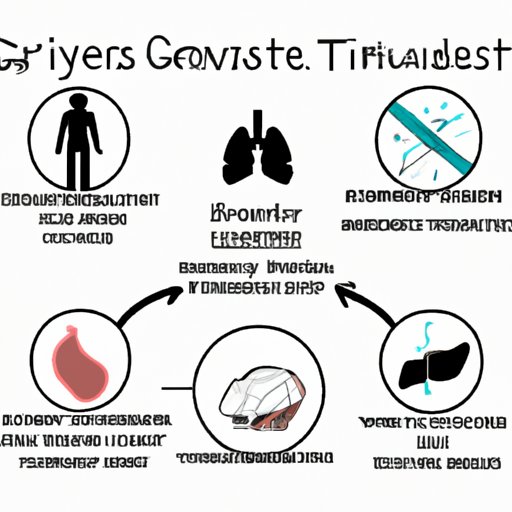I. Introduction
Graves Disease is an autoimmune disorder that can greatly impact an individual’s quality of life. This disease affects the thyroid gland, causing it to produce too much thyroid hormone, leading to a range of symptoms such as weight loss, anxiety, and a rapid heartbeat. In this article, we will explore the various causes and triggers of Graves Disease and what individuals can do to manage it.
II. Breaking Down the Science: The Autoimmune Basis of Graves Disease
The immune system is a complex network of cells and tissues that protect the body from harmful invaders such as viruses and bacteria. In autoimmune diseases such as Graves Disease, the immune system mistakenly attacks healthy tissues in the body, specifically the thyroid gland in this case. This attack causes the thyroid gland to produce too much thyroid hormone, leading to symptoms such as anxiety, weight loss, and a rapid heartbeat.
III. Graves Disease: The Role of Genetics in its Development
Studies have shown that genetics play a role in the development of autoimmune diseases such as Graves Disease. In fact, if a family member has the condition, an individual is at a higher risk of developing it themselves. Researchers have also identified specific genetic markers that are associated with Graves Disease. However, not everyone with these genetic markers will develop Graves Disease, suggesting that environmental factors also play a role in its development.
IV. Uncovering the Triggers of Graves Disease: A Comprehensive Guide
There are a variety of triggers that can cause Graves Disease, including factors such as age, gender, and diet. Women are more likely to develop Graves Disease than men, and it typically presents itself between the ages of 30 and 50. Diet is also an important factor, as certain foods can trigger autoimmune responses in the body. In order to manage Graves Disease, it is important to identify and avoid these triggers.
V. Exploring the Link between Stress and Graves Disease
Stress can have a significant impact on the immune system, and studies have shown that it can contribute to the development of autoimmune diseases such as Graves Disease. In times of stress, the body produces hormones such as cortisol that can affect immune system function. Individuals with Graves Disease should take steps to manage their stress, such as practicing meditation or yoga.

VI. Environmental Factors and Graves Disease: What You Need to Know
Environmental factors such as pollution and exposure to toxins can also contribute to the development of Graves Disease. Chemicals found in everyday products such as cleaning supplies and pesticides have been linked to autoimmune disorders. In order to manage Graves Disease, individuals should try to limit their exposure to these toxins.
VII. Thyroid Dysfunction and Graves Disease: A Closer Look
Graves Disease can cause dysfunction in the thyroid gland, leading to symptoms such as weight loss, fatigue, and irritability. Treatment options for Graves Disease-related thyroid dysfunction include medications and surgery. It is important to work with a healthcare provider to determine the best course of action.
VIII. The Connection Between Graves Disease and Lifestyle Choices
Lifestyle choices such as diet and exercise can have a significant impact on Graves Disease. Certain foods such as gluten and dairy can trigger autoimmune responses in the body, while exercise can help to manage stress levels. Individuals with Graves Disease should work with their healthcare provider to develop a healthy diet and exercise plan.
IX. Conclusion
Graves Disease is a complex autoimmune disorder that can greatly impact an individual’s quality of life. By understanding the causes and triggers of this condition, individuals can take steps to manage it effectively. It is important for those affected by Graves Disease to speak with their healthcare provider about treatment options and lifestyle changes that can help to manage this condition.
